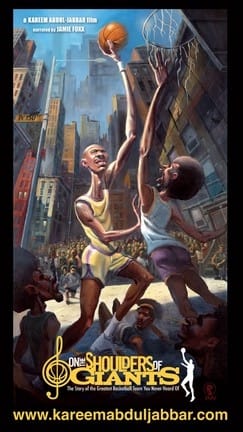
Kareem Abdul-Jabbar is one of the greatest basketball players of all time. In college he led UCLA to three straight NCAA titles, while in the NBA, he won six championships and was the league MVP a record six times. But it’s Kareem’s post-basketball career as an author, scholar, historian and now a documentary filmmaker, that might have the most impact on future generations.
“On the Shoulders of Giants,” narrated by Academy-award winner Jamie Foxx, depicts the era known as the Harlem Renaissance, from the 1920s to the 40s. During this time Harlem was considered the unofficial capital of black America as musicians, artists, poets, writers and a burgeoning black middle class, poured in from the South.
The film focuses on the Harlem Rens, a black-owned basketball team whose jazz-like, improvisational style revolutionized the game and their 1939 season in which they won the first ever world championship. The movie’s sub-title says it all, “The story of the greatest basketball team you never heard of.”
A maiden effort for Kareem and director Deborah Morales, “On the Shoulders of Giants” is a high-energy mix of animation, jazz, archival footage and interviews.
But to appreciate the Rens’ epic achievement, one has to understand race relations of the time. Among widespread restrictions, including pervasive Jim Crow laws, black basketball players were not allowed to compete against whites, except in “exhibition games.”
The Rens played at Harlem’s famous nightclub, “The Renaissance Casino and Ballroom.” But to pay the bills they barnstormed across rural America playing white teams. At the height of the depression, each man earned $35 weekly, playing six to seven days a week. The most renowned opposition player was the late John Wooden of the Indianapolis Kautskys.
Wooden, who would later coach Kareem at UCLA, was fascinated by the Rens’ crisp passing and pressure defense. He often commented that they were the best team he’d ever seen play.
In an era when lynching blacks was commonplace, the Rens usually slept on the team bus or at a local jail, if need be. Often after a game, a police wagon would back up against the gym’s exit so the Rens could leave without being attacked.
In 1939, surprisingly, two black teams were included in the first world championship, the Rens and the Harlem Globetrotters. (Actually from Chicago.) The media loved the white-owned Globetrotters but the Rens were favored by black America. The Rens beat the Trotters in the semi-finals and, against all odds, beat the Oshkosh All-Stars to become the first professional champions of basketball.
Eight years later the NBA was founded but when the Rens applied they were rejected due to race. Unknown to most of today’s super stars, and shocking to realize, the NBA was segregated until the 1950-51 season.
Every aspect of this documentary reflects passion, including Morales’ direction; state of the art graphics, inspired animation, Justin Bua’s artwork (including DVD cover) and a jazz soundtrack which pulsates throughout. Also included is fascinating footage of the Rens in action.
The film’s “interviewees” are an eclectic who’s who of social commentators, musicians, athletes and artists. The list includes Spike Lee, Wynton Marsalis, Charles Barkley, Dr. Cornel West, John Wooden, Maya Angelou, and New York Knicks star, Carmelo Anthony. (Carmelo makes $20 million a year — slightly more than $35 a week — but had no awareness of the difficult trail his predecessors blazed.)
The movie’s title comes from Isaac Newton’s famous quote, “If I have seen further than others, it is by standing on the shoulders of giants.”
Kareem was a giant on the court. In honoring those on whose shoulders he stood, he’s become a giant off the court as well. “On the Shoulders of Giants” is available to watch instantly on Netflix or go to kareemabduljabbar.com.
This Sunday, in Washington D.C., Kareem will receive the Abraham Lincoln Gold Medal for his “commitment to education, understanding and equality.” Jack Neworth writes a weekly humor column, “Laughing Matters,” which appears every Friday in the SMDP and can be reached at Jnsmp@aol.com.

